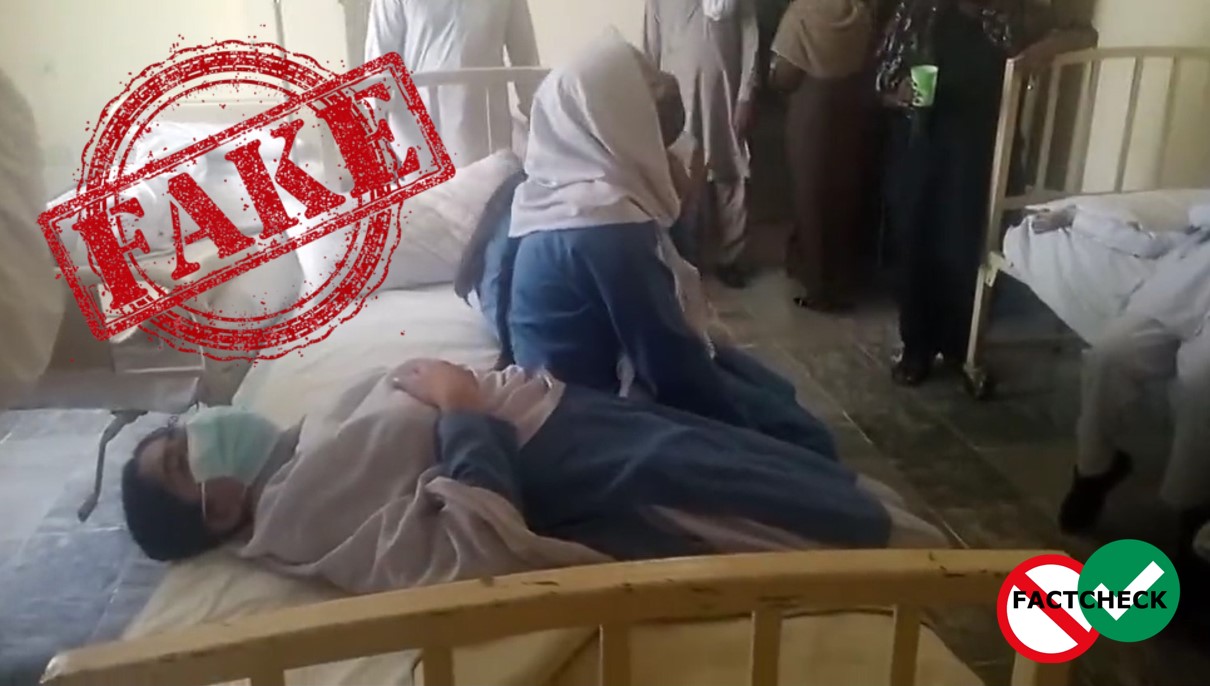Fact Check: Viral Video of Schoolgirls in Distress Falsely Linked to Pakistan’s HPV Vaccination Drive
Islamabad, September 18, 2025 – A video circulating widely on social media platforms like X (formerly Twitter) and WhatsApp has sparked alarm among parents, falsely claiming it depicts schoolgirls in Pakistan collapsing in pain after receiving the Human Papillomavirus (HPV) vaccine. Shared with captions like “Big revelation.
In Pakistan, the HPV vaccine is being administered to children. Protect your children from this vaccine. Look at the condition of the girls,” the clip has amassed thousands of views and shares, fueling vaccine hesitancy at a critical time for the country’s first nationwide HPV immunization campaign.
However, fact-checkers have debunked the claim: The footage is unrelated to any vaccination and dates back over a year to a violent protest incident in Azad Jammu and Kashmir (AJK). Verdict: False.
The Claim
The 20-second video shows a chaotic scene inside what appears to be a school classroom, with several young girls in uniforms visibly distressed—some crying, others slumping over desks or being assisted by peers and adults. Accompanying text in shared posts warns of severe side effects from the HPV shot, urging parents to “protect” their daughters from the ongoing campaign.
One version of the post, shared by a user seemingly affiliated with Pakistan Tehreek-e-Insaf (PTI), garnered over 30,000 views on X, amplifying fears amid the fresh rollout of the vaccine.
This misinformation coincides with Pakistan’s landmark HPV vaccination drive, launched on September 15, 2025, targeting 13 million girls aged 9–14 across Punjab, Sindh, AJK, and Islamabad.
The initiative, backed by the World Health Organization (WHO), Gavi, UNICEF, and the Federal Directorate of Immunization (FDI), aims to combat cervical cancer—the third most common cancer among women in Pakistan, claiming around 3,200 lives annually.
The Facts: An Old Video from a Protest, Not a Vaccine Reaction
A reverse image search on the video’s key frames traces it directly to a YouTube upload dated May 9, 2024, titled “Police fired tear gas at girls’ schools in Dadyal.” The footage captures the aftermath of police action during widespread protests in Dadyal, a town in AJK’s Mirpur district, against inflation, high wheat flour prices, and electricity tariffs.
The unrest, part of the broader Jammu Kashmir Joint Awami Action Committee (JAC) movement, turned violent when demonstrators clashed with law enforcement. Police reportedly fired tear gas shells to disperse crowds, but one canister accidentally landed inside the Government Girls High School in Dadyal, where students were taking annual exams.
The irritant gas caused around 20 girls to faint from coughing, eye irritation, and respiratory distress, with several rushed to a local hospital in critical condition.
Journalist Basharat Raja shared the same clip on X on May 9, 2024, captioning it: “This is also a clip from Dadyal where tear gas was excessively used by police and unidentified individuals dressed in civilian clothes on schools, causing female students engaged in annual examinations to faint.”
The incident was corroborated by a May 10, 2024, report from Dawn newspaper, which detailed a police crackdown in AJK sparking a shutter-down strike and arrests.
No credible reports from May 2024—or any time—link this video to HPV vaccinations, which were not part of Pakistan’s routine immunization program until this month’s launch. Fact-checking organizations like iVerify Pakistan (a project of the Centre for Excellence in Journalism at IBA and UNDP) and FactCheck Pakistan confirmed the mismatch through keyword searches and media archives.
The HPV Vaccine: Safe and Essential
Pakistan’s HPV campaign introduces a single-dose vaccine (Cecolin, WHO-prequalified and Chinese-made) to prevent infections from high-risk HPV strains that cause over 90% of cervical cancers. Health experts emphasize its safety profile:
| Common Side Effects | Description | Frequency |
|---|---|---|
| Pain, redness, or swelling at the injection site | Mild local reaction, similar to other vaccines like measles or tetanus | Very common (up to 80%) |
| Low-grade fever or headache | Temporary systemic response | Common (10–20%) |
| Fainting (vasovagal syncope) | Due to needle anxiety, not the vaccine itself; more common in adolescents | Rare (1–5%) |
Severe reactions are exceedingly rare, with no evidence of widespread harm in over 150 countries using the vaccine, including Muslim-majority nations. The FDI states: “The HPV vaccine is safe, free, and effective,” with rollout through schools, madrassas, and health facilities from September 15–27, 2025.
WHO trained over 49,000 health workers to ensure smooth implementation, aligning with global goals to vaccinate 90% of girls by age 15 by 2030.
Misinformation like this clip risks derailing progress: Cervical cancer is preventable, yet low awareness and myths (e.g., infertility or promotion of promiscuity) have historically limited uptake in Pakistan.
Why This Matters Now
With the campaign in its early days, viral falsehoods could erode trust, especially in conservative communities. iVerify Pakistan noted similar recycled footage used in past anti-vaccine drives, including COVID-19 misinformation. Experts urge parents to consult verified sources like FDI hotlines or WHO resources.
As one cervical cancer survivor shared in a UNICEF story: “I don’t want anyone else to go through the pain I endured.” Vaccination offers that protection—without the pain of outdated propaganda.
For more on the HPV drive, visit the FDI website or WHO’s Pakistan page. If you spot suspicious content, report it to platforms and fact-checkers like FactCheck Pakistan (@PakistanCheck on X).

Nikhil Sharma is a seasoned news editor at TheDailyNewsTimes.com, based in India. With over a decade of experience, he specializes in political, entertainment and cultural journalism. His editorial leadership delivers balanced, impactful content for a global audience. Nikhil’s dedication to truth has earned him widespread respect in the industry.

















